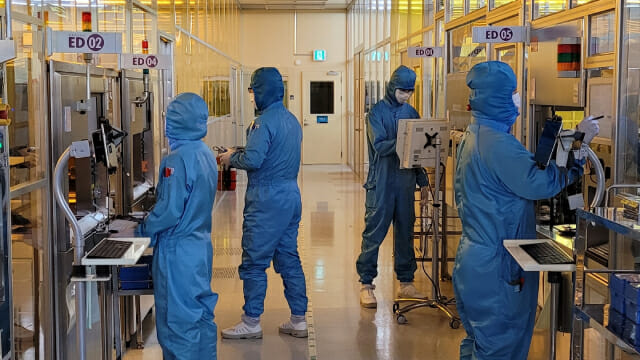
SK Corp. enters the silicon carbide power semiconductor market where market demand is rapidly increasing.
On the 28th, SK Corp. announced that it has acquired a 33.6% stake by investing 26.8 billion won in Yes Power Technics to advance into the silicon carbide (SiC) power semiconductor field, which is an essential component of electronic devices, electric vehicles and hydrogen vehicles.
Yes Power Technics is the only Korean company that has a SiC power semiconductor production system established in 2017. Yes Power Technics is the only Korean company that has established a SiC power semiconductor production system, such as a production line applied with a high-temperature process.
Furthermore, Yes Power Technics is equipped with a SiC power semiconductor production line in Pohang with a capacity of up to 14,400 sheets per year, equivalent to about 140,000 electric vehicles with a 100mm and 150mm mixed production standard.
SK said, “After the first mass production of SiC power semiconductors for Tesla’s Model 3, the world’s largest electric vehicle maker, in 2018, demand has soared, but the supply shortage continues globally due to high technical barriers and not many companies with mass production capabilities.” “The demand from domestic electric vehicle, home appliance, and 5G companies is also increasing rapidly, but there have been criticisms that localization of SiC power semiconductors is urgent, as a few large semiconductor companies in the US and Europe dominate the supply market,” he explained.
“SK Co., Ltd. is focusing on four core businesses such as high-tech materials, green, bio, and digital. It is a policy to nurture the domestic SiC power semiconductor ecosystem through this investment.” In terms of productivity, it has differentiated competitiveness in Korea, and was founded mainly by R&D experts with more than 10 years of experience in developing SiC power semiconductors, and secured 23 patents of its own through continuous R&D. We are securing unrivaled technology.”
Power semiconductors are essential semiconductors that control the current direction and power conversion of electronic products, electric vehicles, hydrogen vehicles, and 5G communication networks that require power.
In particular, SiC power semiconductors are in the spotlight as a next-generation core technology with durability, stability, and versatility, such as maintaining power conversion efficiency of over 98% even in extreme environments of high temperature and high voltage, and are rapidly replacing the existing silicon (Si) power semiconductor market. have.
In fact, the SiC power semiconductor market is regarded as an area with high technological difficulty and high entry barriers among the advanced materials sector. Due to the characteristics of the market, which was formed through a customer-customized small-volume production method, technology that can design optimized chips to meet the diverse needs of customers must be based, and production know-how that can control high-temperature processes is essential.

SK Co., Ltd. plans to reinforce the unique competitiveness of Yes Power Technics such as R&D support and investment in facility expansion, while also concrete plans to create synergy with the group’s semiconductor and wafer businesses.
Related Articles

Qualcomm unveils’cockpit platform’ aimed at automotive semiconductors

Samsung, last year’s semiconductor annual operating profit of 18.81 trillion won…34.17% ↑

The government builds a test bed to demonstrate 100 key strategic items for small managers

Last year’s ICT exports 3.8%↑… Semiconductor and SSD driven
An official from SK Corp. said, “If the existing 1st and 2nd generation semiconductors were the rice of the industry, SiC power semiconductors can be said to be the rice of eco-friendly industries that form the basis of eco-friendly industries such as electric vehicles and renewable energy.” “We will accelerate the implementation of ESG (eco-friendly, social, governance) management, while reducing the dependence of SiC power semiconductors overseas and leading the market.”
Meanwhile, according to market research firms IHS Markit and Yol Development, thanks to the explosive growth of electric vehicles, the SiC power semiconductor market has grown from about $700 million last year to about $10 billion in 2030, with an annual average of 32%. It is expected to show a high growth rate.
